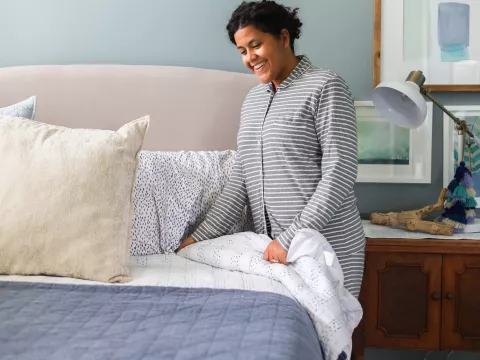- AdventHealth

Many of us have seen the devastating effects of Alzheimer’s disease firsthand in a friend or family member. Though much is still being discovered about how the disease develops and progresses — and who is most at risk — there are a few ways we can try to avoid or delay it. One of these is simply getting enough sleep. Learn more about what exactly that means and how you can work to catch more quality Zzzs.
How Lack of Sleep Is Linked to Alzheimer’s
Alzheimer’s disease destroys brain cells that process, store and retrieve data resulting in loss of memory and other important mental functions. Beta-amyloid (a metabolic waste byproduct) builds up in your brain cells to form plaque (a sticky deposit) that interferes with neuron communication. This plaque leads to the brain impairment we know as Alzheimer’s.
While you sleep, your body clears beta-amyloid from your brain. Sleep deficiency interferes with this natural process and allows harmful buildup of beta-amyloid. Just one night of missed or poor sleep shows a noticeable increase in this byproduct. Chronic sleep loss allows beta-amyloid to accumulate in harmful amounts.
Lack of Sleep Is Linked to Other Health Problems
Diet and exercise are essential to living a healthy life, but did you know sleep is just as important? Not getting enough sleep or getting poor quality sleep can lead to a host of health problems in addition to being linked to Alzheimer’s. These health problems include:
- Cognitive dysfunction (brain fog)
- Depression
- Type II Diabetes
- Stress
- Weight gain
Other Ways Lack of Sleep Affects Your Body
Lack of sleep can affect your body in many ways, including:
- Daytime drowsiness
- Decreased hand-eye coordination
- Depression
- Increased anxiety
- Intensified effects from alcohol use
- Micro sleeping (brief periods of sleeping while awake)
- Slowed reflexes
You’re more likely to make poor choices or get in an accident when you’re sleep-deprived, even more reason to prioritize time for rest.
Ways to Get Better Sleep
Sleep is a beautiful thing — when you can get it. Many people are fortunate enough to fall asleep as soon as their heads hit the pillow and sleep soundly through the night. Others are not so lucky.
The good news is that what you do during the day can positively influence your sleep at night. The food and drinks you consume, the medications you take, your daily schedule and how you spend your evening hours all affect your quality of sleep. The following tips may help you fall and stay asleep:
- Avoid caffeine, alcohol or large meals before bedtime
- Exercise during the day
- Follow a consistent sleep schedule (same time each night, allowing for at least 7 hours of sleep)
- Go to bed only if you’re sleepy (if not asleep in 20 minutes, get out of bed)
- Keep your bedroom dark, relaxing, free of electronic devices and at a comfortable temperature
- Reduce fluid intake before bedtime
- Rise at the same time each morning (even on weekends and holidays)
Make a Plan
Insufficient sleep is an epidemic that has a lot of health implications. If you or a loved one has trouble falling asleep, staying asleep or getting adequate sleep, talk with your doctor. Your primary care physician can help you make a plan for improving your sleep to improve your whole health.
Learn more about how to achieve the sleep of your dreams with our Sleep Tips for Every Age.





